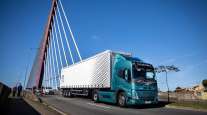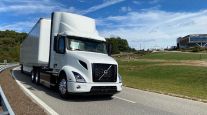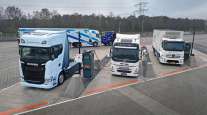Technology Could Reduce Costs, Increase Safety, OEM Executive Says
NASHVILLE, Tenn. — Developing technologies will continue to reshape the trucking industry through reduced maintenance costs, increased safety due to lower driver fatigue and higher fuel efficiency, a Volvo Group official said here during a presentation at Heavy Duty Dialogue.
Rich Ferguson, a senior vice president at Volvo, said there are many technologies reaching the trucking industry that he “could not have thought of 15 years ago.”
“The change is upon us, and the change is moving forward today,” he said.
On the safety side, he pointed to studies that have found about 80% of accidents could be averted with technologies such as collision avoidance systems. He said these and other systems such as lane departure have the ability to warn a driver that he or she is fatigued and should get off the road before a potential accident occurs.
He said technology will help truckers better avoid potential trouble spots through real-time weather and traffic information, as well as warnings about obstacles in the road ahead, such as animals or debris.
Ferguson also said advancements in remote diagnostics are reducing downtime, and determining problems with trucks far faster than before.
“The truck is the main focal point in accumulating data,” he said, adding that analysis of fault codes allows fleets make a more informed decision on the need for repairs.
In the future, he said many modern trucks will be repaired remotely, further reducing downtime.
On fuel economy, he said the integration between the engine and transmission remains critical to improving fuel efficiency. But he added there needs to be a larger integration of the entire vehicle to achieve additional gains.
During the presentation, Ferguson also showed a video of Volvo trucks and cars traveling along a highway in a “road-train” formation — where the vehicles were driving themselves while the drivers were reading or using a computer.
He said while this wouldn’t work in a city, these road-trains could work on long stretches on highways. He compared the technology with being a passenger on a plane and said the issue will be more about public acceptance than about highway safety.
Additional coverage of Heavy Duty Dialogue will be included in the March 17 print edition of Transport Topics.




